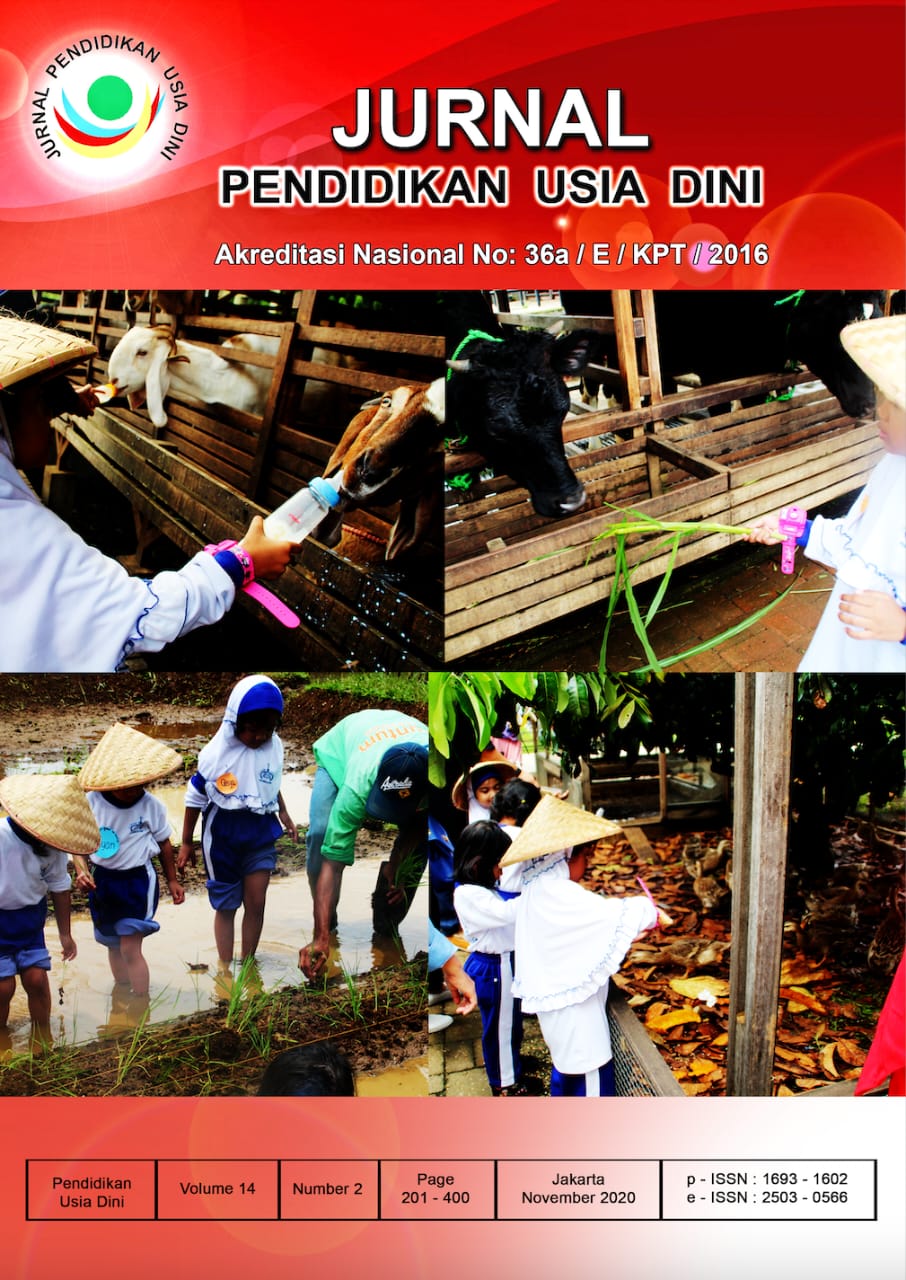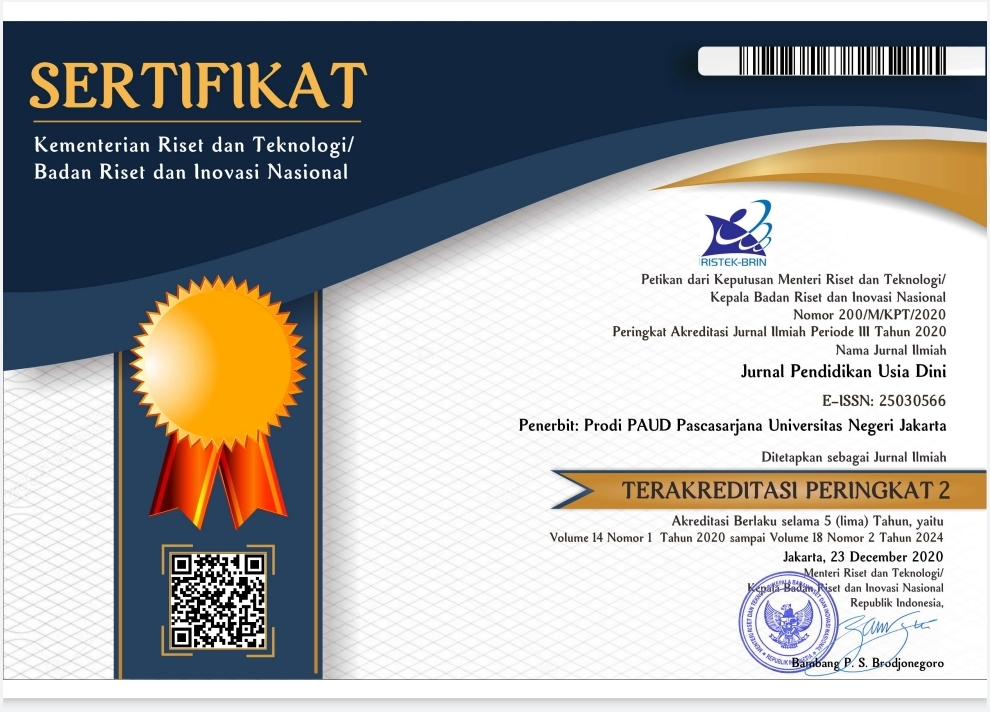Outstanding Educator Performance: Professional Development in Early Childhood Education
DOI:
https://doi.org/10.21009/JPUD.142.15Abstract
Early childhood education as the main foundation of one's education is determined by the quality of teachers who can be seen through the performance of teachers and teachers, so the discourse of professional development is important. This study aims to determine how the performance of superior early childhood teachers and performance measurement as performance standards for outstanding teachers. Qualitative research is carried out with a psychological approach that is carried out directly on the object under study, to obtain data relating to aspects of teacher performance so that increased performance becomes an example for other teachers. Research data collection techniques using interviews, documentation, and observation. The results showed that the performance of outstanding early childhood teachers always tried to hone and control themselves by participating in outstanding teacher competitions to monitor their professional condition and performance. Early childhood teachers who have extraordinary grades also have strong scientific insight, understand learning, have broad social insights, are positive about their work, and show work performance according to the required performance criteria. The teacher's performance in the extraordinary category is the success and ability of the teacher in carrying out various learning tasks. Measuring the performance of early childhood teachers with achievement has two tasks as measurement standards, tasks related to the learning process and tasks related to structuring and planning learning tasks. Referring to these two tasks, there are three main criteria related to teacher performance in early childhood teacher professional development literacy, namely processes, teacher characteristics, and outcomes or products (changes in student attitudes). In the learning process, the performance of early childhood teachers who excel can be seen from the quality of work carried out related to professional teacher learning activities.
Keywords: Early Childhood Education, Outstanding Educator Performance, Professional Development
References:
Abry, T. (2015). Preschool and kindergarten teachers’ beliefs about early school competencies: Misalignment matters for kindergarten adjustment. Early Childhood Research Quarterly, 11.
Algozzine, B., Babb, J., Algozzine, K., Mraz, M., Kissel, B., Spano, S., & Foxworth, K. (2011). Classroom Effects of an Early Childhood Educator Professional Development Partnership. NHSA Dialog, 14(4), 246–262. https://doi.org/10.1080/15240754.2011.613125
Anders, Y. (2015). Literature Review on Pedagogy. 62.
Ary, D., Jacobs, L. C., Razavieh, A., & Ary, D. (2010). Introduction to research in education (8th ed). Wadsworth.
Bukoye, R. O. (2019). Utilization of Instruction Materials as Tools for Effective Academic Performance of Students: Implications for Counselling. Proceedings, 2(21), 1395. https://doi.org/10.3390/proceedings2211395
Choo, K. K. (2010). The Shaping of Childcare and Preschool Education in Singapore: From Separatism to Collaboration. 4, 12.
Driscoll, K. C., & Pianta, R. C. (2010). Banking Time in Head Start: Early Efficacy of an Intervention Designed to Promote Supportive Teacher–Child Relationships. 29.
ECE – TPEs and CAPEs. (2019). California Early Childhood Education Teaching and Administrator Performance Expectations. Commission on Teacher Credentialing.
Eggum-Wilkens, N. D. (2014). Playing with others: Head Start children’s peer play and relations with kindergarten school competence. Early Childhood Research Quarterly, 12.
Goodfellow, J. (2001). Wise Practice: The Need to Move beyond Best Practice in Early Childhood Education. Australasian Journal of Early Childhood, 26(3), 1–6. https://doi.org/10.1177/183693910102600302
Guskey, T. R. (2001). Helping Standards Make the GRADE. 10.
Hamre, B. K., & Pianta, R. C. (2005). Can Instructional and Emotional Support in the First-Grade Classroom Make a Difference for Children at Risk of School Failure? Child Development, 76(5), 949–967. https://doi.org/10.1111/j.1467-8624.2005.00889.x
Han, J., Luo, X., & Luo, H. (2021). Development and Validation of Preschool Teachers’ Caring Behaviour Questionnaire and Its Internal Mechanism with Work Performance. Open Journal of Social Sciences, 25.
Hargreaves, A. (2000). Mixed emotions: Teachers’ perceptions of their interactions with students. Teaching and Teacher Education, 16(8), 811–826. https://doi.org/10.1016/S0742-051X(00)00028-7
Harwood, D., Klopper, A., Osanyin, A., & Vanderlee, M.-L. (2013). ‘It’s more than care’: Early childhood educators’ concepts of professionalism. Early Years, 33(1), 4–17. https://doi.org/10.1080/09575146.2012.667394
Hedges, H., & Cooper, M. (2016). Inquiring minds: Theorizing children’s interests. Journal of Curriculum Studies, 48(3), 303–322. https://doi.org/10.1080/00220272.2015.1109711
Hughes, A., & Menmuir, J. (2002). Being a Student on a Part-time Early Years Degree. Early Years, 22(2), 147–161. https://doi.org/10.1080/09575140220151486
Hur, E., Jeon, L., & Buettner, C. K. (2016). Preschool Teachers’ Child-Centered Beliefs: Direct and Indirect Associations with Work Climate and Job-Related Wellbeing. Child & Youth Care Forum, 45(3), 451–465. https://doi.org/10.1007/s10566-015-9338-6
Ishimine, K., Tayler, C., & Bennett, J. (2010). Quality and Early Childhood Education and Care: A Policy Initiative for the 21st Century. International Journal of Child Care and Education Policy, 4(2), 67–80. https://doi.org/10.1007/2288-6729-4-2-67
Katz, L. G. (2015). Distinctions between academic versus intellectual goals for young children. 4.
Kim, K. (2018). Early childhood teachers’ work and technology in an era of assessment. 14. https://doi.org/10.1080/1350293X.2018.1533709
Molla, T., & Nolan, A. (2019). Identifying professional functionings of early childhood educators. Professional Development in Education, 45(4), 551–566. https://doi.org/10.1080/19415257.2018.1449006
Moyles, J. (2001). Passion, Paradox and Professionalism in Early Years Education. Early Years, 21(2), 81–95. https://doi.org/10.1080/09575140124792
Nolan, A., & Molla, T. (2018). Teacher professional learning as a social practice: An Australian case. International Studies in Sociology of Education, 27(4), 352–374. https://doi.org/10.1080/09620214.2017.1321968
Oberhuemer, P. (2005). Conceptualising the early childhood pedagogue: Policy approaches and issues of professionalism. European Early Childhood Education Research Journal, 13(1), 5–16. https://doi.org/10.1080/13502930585209521
Osgood, J. (2004). Time to Get Down to Business?: The Responses of Early Years Practitioners to Entrepreneurial Approaches to Professionalism. Journal of Early Childhood Research, 2(1), 5–24. https://doi.org/10.1177/1476718X0421001
Osgood, J. (2007). Professionalism and performativity: The feminist challenge facing early years practitioners. 14. https://doi.org/doi: 10.1080/09575140600759997.
Osgood, J. (2009). Childcare workforce reform in England and ‘the early years professional’: A critical discourse analysis. Journal of Education Policy, 24(6), 733–751. https://doi.org/10.1080/02680930903244557
Pianta, R. C. (2016). Teacher–Student Interactions. Policy Insights from the Behavioral and Brain Sciences, 3(1), 8. https://doi.org/DOI: 10.1177/2372732215622457
Piotrkowski, C. S., Botsko, M., & Matthews, E. (2001). Parents’ and Teachers’ Beliefs About Children’s School Readiness in a High-Need Community. 22.
Rodgers, C. R., & Raider‐Roth, M. B. (2006). Presence in teaching. Teachers and Teaching, 12(3), 265–287. https://doi.org/10.1080/13450600500467548
Sheridan, S. M., Edwards, C. P., & Marvin, C. A. (2009). Professional Development in Early Childhood Programs: Process Issues and Research Needs. 26.
Thomas, D., & Brown, J. S. (2011). Cultivating the Imagination for A World of Constant Change. 37.
Urban, M. (2008). Dealing with uncertainty: Challenges and possibilities for the early childhood profession. European Early Childhood Education Research Journal, 16(2), 135–152. https://doi.org/10.1080/13502930802141584
Vartiainen, H., Leinonen, T., & Nissinen, S. (2019). Connected learning with media tools in kindergarten: An illustrative case. Educational Media International, 56(3), 233–249. https://doi.org/10.1080/09523987.2019.1669877
Walker, A., & Qian, H. (2018). Exploring the Mysteries of School Success in Shanghai. 17.
Wall, S., litjens, I., & Miho, T. (2015). Early Childhood Education and Care Pedagogy Review. OECD Publishing. www.oecd.org/edu/earlychildhood
Downloads
Published
How to Cite
Issue
Section
License
JURNAL PENDIDIKAN USIA DINI work is licensed under a Creative Commons Attribution 4.0 International License. (http://creativecommons.org/licenses/by/4.0/)





